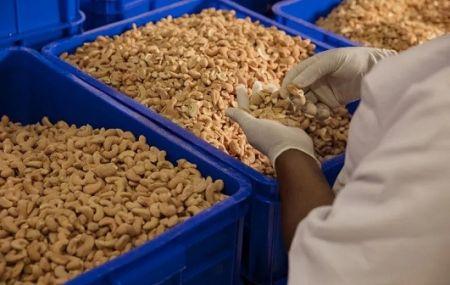
-
Cashew processors in Senegal are raising concerns over access to raw nuts despite recent government support
-
In 2024, only 3% of the country’s cashew harvest was processed locally, causing losses and job cuts
-
Processors warn of repeat risks unless a promised stock of 7,000 tons is secured quickly
Cashew processors in Senegal are sounding the alarm over challenges facing their industry. Nearly two months into the 2025 cashew marketing campaign, industry players continue to struggle with serious supply difficulties that are hindering their processing operations.
“Traders are still buying and exporting all the raw nuts before the rainy season, depriving local processors of the essential raw material for their operation. Meanwhile, processors, despite facing growing demand for processed products, remain idle, unable to operate due to lack of stock,” stated the association of processors in a press release published on Thursday, May 15.
These concerns come a month after the government announced new measures to support the processing sector. On April 5, Prime Minister Ousmane Sonko unveiled several interventions for the sector, including the establishment of an export tax on raw nuts at 32 FCFA/kg, a processing premium, the creation of a safety stock of 7,000 tons, and the facilitation of access to financing.
Industrialists have broadly welcomed these measures, but express doubts about their real-world implementation. “It is imperative to act quickly to secure a stock of 7,000 tons of raw nuts for the processors, as announced, but which is slow to materialize on the ground. Without this, the sector risks losing another year, with disastrous consequences for jobs, businesses, and the local economy,” warn the processors.
In addition to limited nut availability, the industrialists identify other obstacles, such as the absence of a formally organized system of nut collection that prioritizes local processors, the need for modernization of equipment, tough access to financing, and poor coordination among value chain stakeholders.
It’s worth noting that in 2024, processors already encountered difficulties procuring raw materials. Preliminary estimates by the independent trade advisory service N’kalô in its October 31 briefing on the African raw material market suggest that Senegal only processed about 1,500 tons of cashew nuts, or barely 3% of the national harvest, estimated at 66,500 tons in 2024.
This weak performance in processing activities led to severe consequences, including financial losses, layoffs, shutdown of processing plants, and the loss of international business contracts for some operators.
In Senegal, the cashew sector directly employs nearly 1,000 people and is estimated to be a source of income for over 100,000 people, according to official data. However, most of the value created in the processing segment is lost, with the country exporting almost its entire harvest of between 65,000 and 75,000 tons each year in raw form.
According to Senegal’s association of processors, a ton of raw nuts sold generates about CFA700,000 (around $1,200), compared to over CFA1.4 million for a ton processed. This value-added difference makes processing a strategic lever for industrialization and rural employment.
This issue becomes more critical given that the country received $92 million in cashew nut export earnings, of which only $476,000 came from processed nuts, according to data compiled by the Trademap platform.











Comments